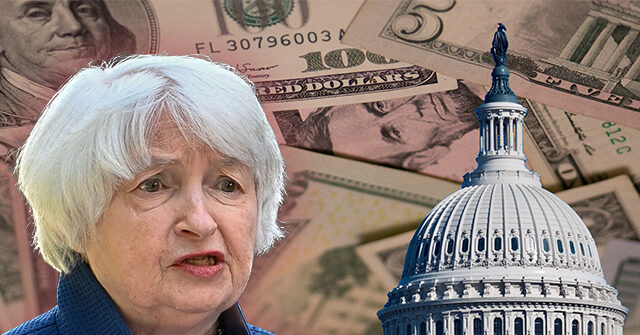
The U.S. Treasury Department said on Friday that there is only $88 billion in extraordinary measuresleft for the government to pay its bills as of Wednesday, down from $110 billion a week previously.
Since Wednesday, May 10, the U.S. is said to just have $88 billion left before it reaches the debt ceiling. Just one week earlier, there was stated to be $110 billion left, meaning just about a quarter of the $333 billion of licensed measures are left for the government to use in the past striking the debt limit.
As Bloomberg kept in mind, “The measures are a collection of different accounting gimmicks that make it possible for the administration to keep selling debt although it has actually run up against the $31.4 trillion loaning ceiling enforced by Congress.”
Earlier in the month, Treasury Secretary Janet Yellen predicted, in a letter to Home Speaker Kevin McCarthy (R-CA), that the U.S. might run out of cash to pay its expenses as early as June 1, based on the data at the time.
“We will be not able to continue to satisfy all of the federal government’s obligations by early June, and possibly as early as June 1, if Congress does not raise or suspend the debt limitation prior to that time,” she wrote.
“Waiting up until the last minute to suspend or increase the debt limit can trigger serious damage to company and consumer self-confidence, raise short-term loaning expenses for taxpayers, and adversely affect the credit ranking of the United States,” she added.
Nevertheless, as Breitbart News Economics Editor John Carney described in the May 3 Breitbart Business Digest:
That is significantly earlier than the majority of analysts were forecasting. Of course, it makes good sense for Yellen to take a conservative stance here. It’s far easier to push back the s0-called “x-date” than it would be to pull it forward. Having the Treasury Secretary unexpectedly and all of a sudden announce that the federal government had run out of money earlier than prepared for might trigger a financial panic.
Reasonably, the government most likely has a couple of more weeks of financing than Yellen is letting on. Based on the most current Treasury forecasts, analysts at Bank of America say the federal government will not lack cash until July 28.
We take Yellen utilizing the earlier date as a positive advancement since it signals that the administration wishes to begin settlements faster. The Biden White Home seems moving away from their earlier persistence on a “clean” financial obligation ceiling bill that would be unacceptable to Home Republicans.
This all comes as President Joe Biden and Home Speaker Kevin McCarthy (R-CA) have finally started to negotiate on the financial obligation ceiling after the president declined to sit down with the California lawmaker for nearly 100 days.
The House Republicans passed legislation– the Limit, Save, Grow Act of 2023– to raise the financial obligation ceiling by $1.5 trillion last month, while dealing with America’s nationwide deficit by saving the government an approximated $4.8 trillion over the next ten years.
Jacob Bliss is a reporter for Breitbart News. Compose to him at jbliss@breitbart.com!.?.! or follow him on Twitter@JacobMBliss.

